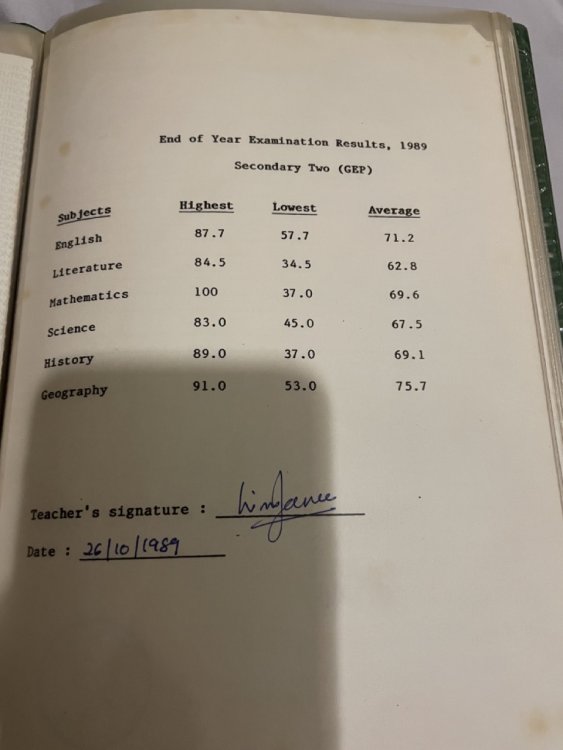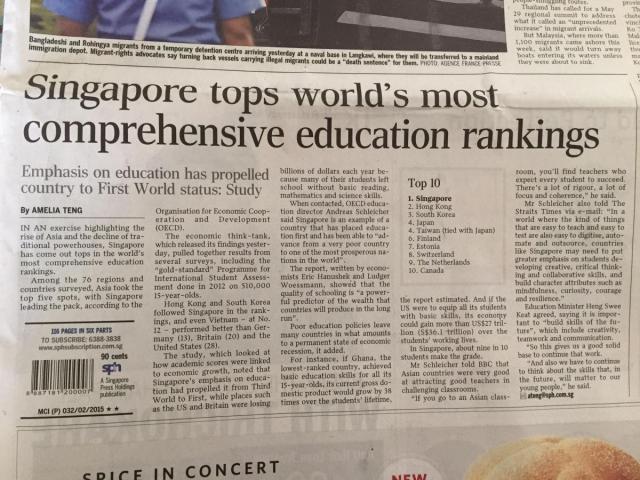Search the Community
Showing results for tags 'education'.
-
Gifted Education Programme offers deeper learning, but kids can still excel outside of it https://www.straitstimes.com/singapore/parenting-education/gifted-education-programme-a-differentiated-curriculum-but-smart-kids-can-still-excel-even-if-they-don-t-get-into-it SINGAPORE – Primary 3 pupils will find out this week if they have been selected for the Gifted Education Programme (GEP). With about 1 per cent of the cohort entering the GEP each year – ranging from 370 to 400 pupils, depending on the cohort size – this might mean disappointment for a number of children. But experienced educators say the three-year programme – started in 1984 for intellectually gifted Primary 4 to 6 pupils – is designed for that small group of youngsters who will thrive in it. Pupils are selected for the GEP through a two-stage process: a screening exercise comprising English and mathematics tests, and a selection exercise comprising English, maths and general ability tests. The English and maths tests assess students on concepts taught in the syllabus from Primary 1 to 3, while the general ability test assesses students on their logical thinking and general reasoning abilities. The GEP’s differentiated curriculum aims to nurture the depth of thinking and creative dispositions in such students. One of them is Christian Choong, 13, who taught himself the number system and how to read and write when he was three. When he started primary school, he would finish class work in less than half the given time, and was often bored in school and had trouble socialising with his peers. His father Adrian Choong, 44, guessed then that Christian could be a gifted child and hoped he would get into the GEP. Mr Choong, now a teacher and himself a former GEP student, faced similar issues when he was young and says being in the programme helped him. He adds: “I hoped my son would get into the GEP, not because it is a more prestigious programme or that the schools have better teachers, but because I believe the GEP has the teaching and learning environment that would benefit him.” He and his wife Esther Cheng, 44, a stay-at-home mum, have a younger son, Zachary, 11, who is in the mainstream programme. Mr Choong says he did not send Christian, now in Secondary 1, for any GEP preparatory classes, but got him books on logic and reasoning tests to let him try the quizzes under timed conditions at home just before he went for the selection tests. He did not want his son’s ability to be clouded by his fear of taking such examinations in an unfamiliar environment. Christian got through the two rounds of tests and entered Rosyth School’s GEP, where he enjoyed meeting pupils he shared common interests with. “He loved being with friends who were as crazy, nerdy and geeky as he was. He would have endless conversations with his classmates about obscure mathematical topics,” says Mr Choong. He adds: “Sometimes, he would feel frustrated by his work, but struggling with the schoolwork made the eventual success all the more rewarding.” What does a GEP pupil learn? The GEP curriculum is an “enriched” version of the mainstream one. It is broader and more in-depth, with opportunities for research and inquiry-based activity. Mr Matthew Ngiam, a teacher from Tao Nan School, who has been teaching children in the GEP for 15 years, says pupils are exposed to more challenging questions and concepts. “It takes a certain cognitive ability to understand the requirements of the tasks,” he adds. For example, in maths, Primary 4 pupils learn about the ancient numeration systems, such as the Roman, Egyptian and Babylonian systems. They may research into an area of interest, like graph theory, which is not taught in primary school. When learning a topic such as algebra, mainstream Primary 6 pupils may do equations with one variable, but GEP students are exposed to questions with more variables, including simultaneous and quadratic equations. Mr Ngiam says many GEP students display similar character traits – a deep knowledge of an area of interest, a high level of curiosity, an excellent memory and an intense focus when they work on something they are passionate about. He adds that he has learnt to be flexible in his thinking as his GEP pupils offer perspectives that he has never come across. “When I go into class, I have to prepare myself that teaching is not going to be ‘one direction’. I’m the teacher, but they could end up being the ones teaching me,” he says. Apart from being able to comprehend abstract thinking, they can gather information from everywhere to synthesise something new, he says. “They go deeper than what is required in the GEP curriculum,” he adds. Likewise, for English, while the basics like grammar and vocabulary are covered, much of English lessons is literature, where pupils are introduced to various literary genres such as mysteries, fairy tales and historical fiction. Lessons are filled with discussions, where students make interdisciplinary and real-life connections, says Mrs Elaine Chong, head of the GEP at Raffles Girls’ Primary School, who has taught in the GEP for 22 years. “We don’t have ‘one answer to one question’. Some pupils may not be used to this approach where there is a lot of discussion. It could be unsettling for them,” she says. There is an individualised study option, where they learn basic research skills in Primary 4, such as how to gather data, and do analysis and presentations. In Primary 6, one of the text genres they study is biographies, where they analyse the values of a person and the factors for his or her success. The pupils are then tasked to come up with a biography of a family member, before they reflect on what they have learnt from the process. They are exposed to concepts such as discrimination and stereotypes, based on the texts they learn. “There is a lot of critical thinking. They may have to challenge their own thinking and learn to accept the views of others. It can be quite challenging, but they enjoy it because it involves higher-level thinking skills,” says Mrs Chong. Raedon Tan, 10, a Primary 4 GEP pupil from Tao Nan School, says while the work is harder in the GEP, he enjoys being able to explore all subjects at a deeper level, especially maths, his favourite subject. “We do a lot of open discussions, which also means that we can understand the perspectives of our peers,” he says. All GEP pupils take the same GEP assessment for English, maths, science and social studies. They will, however, take school-based assessments with their mainstream peers for mother tongue languages and higher mother tongue languages. At the end of Primary 6, they sit the same Primary School Leaving Examination as mainstream pupils. Their choices of educational pathways for secondary schools are the same as those open to mainstream pupils, such as the integrated programme or O-level track. How do you nurture a child who did not get into the GEP? High-ability learners who did not get selected for the GEP can still take up school-based enrichment programmes for upper-primary pupils, such as the Excellence 2000 (E2K) Mathematics Programme and E2K Science Programme. Schools also offer enrichment activities in both academic and non-academic areas, for example, coding, robotics and design thinking. A spokesman for the Ministry of Education says schools can nominate their high-ability learners to participate in its gifted education branch’s centrally organised programmes, such as the creative writing programme and the Primary Mathematics Project Competition, to provide them with further exposure. But parents can also do their part to nurture these high-ability children at home, says teachers. Mr Ngiam says parents should encourage the child to explore his or her areas of interest and provide opportunities for the child. “It starts from home. If the focus at home is only academic excellence or getting into the GEP, that takes away the joy of learning, which comes from a child’s curiosity-driven exploration,” he adds. By fostering a supportive and nurturing environment at home, parents are setting their child up for long-term success, says Mr Ngiam. Mrs Chong agrees, adding that parents can be the resource person for their child. For example, if a child likes writing, parents can expose him or her to different genres of books. “Be the audience for them when they write, give them feedback to encourage them. That is how you help them build on their passion. The GEP is not the only way to stretch children,” she says. Can students be trained to get into the GEP? Over the years, enrichment centres have been offering classes that claim to coach students to get into the GEP. With the programme offered in nine primary schools and with a class size of around 25 pupils, some parents view the GEP as a prestigious programme and send their children for lessons, hoping they will qualify for it. However, MOE has long cautioned parents against doing so, as it might inflate test scores and not reflect these students’ actual intellectual potential. Mr Ngiam says parents who want to send their children for prep classes should understand that the GEP is designed for children who have already demonstrated exceptional ability or aptitude in specific areas, such as an advanced knowledge of mathematical concepts. He says one concern of attending such classes is the impact on a child if he or she does not make it to the GEP. “There is the risk of your child feeling a lack of self-worth if he or she doesn’t get in,” he says. Another concern is when children, who are not naturally gifted, get into the GEP through test preparation. “The curriculum is designed based on the fact that they are naturally gifted. If they are not and come into the programme, they may find it a struggle to keep up with the pace,” says Mr Ngiam. Mrs Chong says that if kids in the GEP struggle to cope, parents may end up sending them for more tuition in order to keep up. “If they go for many enrichment lessons, they have no time for themselves or to reflect on their learning,” she says. Mr Zhou Shicai, founder of NickleBee Tutors and who was a former GEP student, says his centre does not offer GEP preparatory classes as he believes that giftedness is mostly an innate ability, and he discourages parents from sending their children to such classes. His enrichment centre offers advanced maths programmes for upper-primary pupils from both the GEP and mainstream programme. But he recently started teaching three lower-primary students with exceptional talent in maths in his personal capacity at their parents’ request. “This is not aimed at helping them get into the GEP, but rather to help them realise their full potential in maths because they already show innate talent,” he said. Mr Choong, who coached his son for the GEP tests, says it is possible to prepare to a certain extent, but parents must consider if a child will thrive in the GEP environment. “Your child can be trained to get into the GEP. But should your child be trained to get into the GEP? That is the question that parents should be asking themselves,” he says.
-
I just saw my daughter sec 2 report card and I find our education system getting quite ridiculous. When I was in sec 2, my report card comes with the average, highest and even lowest score so you know where you stand. As you can see, different subjects has very different mean score. A score of 62 in literature is average but pretty bad for geography as exams are all different. I am surprised they even give the lowest score, just to rub it in on the poor kid I guess. When my daughter was in sec 1 last year, the school only gave out the median score which is ok I guess. Although it is nice to have the highest for something to aim, I am ok with just the median so I know how my daughter is doing. This year, they even removed the median score. how am I supposed to know how my daughter is doing in her exams? I really think this "grades are useless" thing has gone waaaay too far. My son just completed Pri1 and 2 and I totally have no idea how he is doing in school because there is no exams.My daughter just finished sec2 and she have a bunch of grades but no median score so I have totally no idea how good/bad she is doing.... Are all schools like that? removing the median score so nobody has any benchmark?
- 484 replies
-
- 1
-

-
Education getting softer in Singapore and the GEP
noobcarbuyer replied to Wind30's topic in Lite & EZ
Revamping the GEP, after 40 years – What you need to know! https://www.kiasuparents.com/kiasu/article/revamping-the-gep Prime Minister Lawrence Wong announced, during the recent National Day Rally, that the Gifted Education Programme (GEP) will be discontinued in its current form, and instead is to be updated and expanded to benefit high-ability students in all Primary Schools. The main gist of the changes to the GEP would be: All Primary Schools will be equipped to identify high-ability learners and have their own school-based programmes to stretch these students in their areas of strengths and interests. Students no longer have to transfer to a school offering GEP and can continue in their current schools with their friends. Students who excel in particular subjects can attend after-school enrichment modules, about once a week, at nearby schools with their peers.ldren can mix around and feel at home with other intellectually gifted children. READ MORE : https://www.kiasuparents.com/kiasu/article/revamping-the-gep -
what planet is this guy living in??? The teachers my daughter's primary school EMPHASIZE keywords so much.... PSLE science today is just keywords. The marking scheme itself is keywords based... alternative answers... err are you going to risk it ??? PSLE can "show our moral character" ???? This guy really come across as full of ****
-
Singapore voted no. 1 in Education worldwide which helps propel us to be first world country. Whilst I won't deny this is true, I'm just wondering what price we pay for achieving this. Pressure on our children at a young age, streaming ie segregating the children by their results, book smart children etc. Interested to know what do you guys feel, worth it? Perhaps.......
- 113 replies
-
- 12
-

-
- education
- singapore no. 1
-
(and 1 more)
Tagged with:
-
suppose a couple has S$150k and 4 kids below 10 now, and hoping by the time the kids reach 18, to have saved at least 120k per kid for their uni education....if the kids decide to pursue such a path... (else the couple promise themselves to blow it on a fast car then). what would be a safe option for the couple? they would NOT like to consider the following: stocks - they have a reverse midas touch property - their view is its not the right time now as its peaking all suggestions are appreciated. Thank you
- 88 replies
-
I am a bit ambivalent on the recent ban on private tutoring but I must give it to CCP for cracking down on online gaming. Calling it spiritual opium is quite appropriate. These games are designed to be addictive. Some may say free choice but many of my friends with kids didn't think it is such a bad idea. https://www.scmp.com/tech/big-tech/article/3146437/chinas-video-game-industry-stormy-waters-country-grapples-its-love
- 322 replies
-
- 7
-

-
.png)
-
- china
- online gaming
-
(and 1 more)
Tagged with:
-
SINGAPORE - The first inspector-general in the Singapore Armed Forces (SAF) will take on a new role to oversee the pre-school sector from Dec 15. Mr Tan Chee Wee, 47, will be appointed chief executive of the Early Childhood Development Agency (ECDA). He was appointed CEO-designate on Sept 1, ECDA said on Thursday (Sept 16). He will replace current CEO Jamie Ang, 44, who has been heading ECDA since Oct 1, 2019. Ms Ang's term ends on Dec 14. Mr Tan, who held the rank of brigadier-general in the SAF, established the Inspector-General's Office to strengthen safety governance and management systems in SAF in his role as inspector-general. The role was introduced in Feb 2019 as part of measures to improve safety following a spate of military fatalities. Mr Tan had concurrently served as the SAF Chief of Staff - Joint Staff. In this role, he drove efforts to develop the blueprint for the next-generation SAF in the areas of warfighting concepts and organisation structures, said ECDA. He has also held a range of senior appointments in the Ministry of Defence (Mindef) and the SAF. These include director of joint operations, commander of air defence and operations command, director of the policy office, and defence attache in Washington. He joined the SAF in 1993 as an air traffic controller in the Republic of Singapore Air Force. Mr Stanley Loh, the Second Permanent Secretary for Social and Family Development, said: "Mr Tan's extensive leadership and operational experience in Mindef and the SAF positions him well to lead ECDA to partner the pre-school community in the transition towards Covid-19 resilience." He will also help ECDA to deliver on its commitment to improve the accessibility, affordability and quality of pre-schools, he added. Source: ST/ https://www.straitstimes.com/singapore/safs-first-inspector-general-to-oversee-preschool-sector-from-dec-15 ----------- Leadership and operational experience in mindef = leadership in early childhood development?? 🤨
-
From September, the professional jobs networking site LinkedIn will pilot a new job-matching platform in Singapore that focuses on candidates’ skill sets, rather than educational qualifications and past job titles. This is to give jobseekers a better shot at gaining access to new employment opportunities. The Skills Path initiative, supported by the National Jobs Council, will allow applicants here to complete skill assessment tests unique to the job roles they are applying for, so as to demonstrate their competencies. They therefore do not need to rely solely on their traditional qualifications to get a foot in the door. Employers may then evaluate candidates based on their skills rather than judge them solely on their degrees, job titles and networks to fill a vacancy, LinkedIn said on Saturday (Aug 14). For a start, the pilot platform will feature one job advertisement each from eight different companies that have already come on board the initiative, with plans to get more companies to join. The employers are: Property developer CapitaLand, OCBC bank, food delivery firm FoodPanda, NTUC Enterprise, pharmaceutical company Zuellig Pharma, and e-commerce sites Carousell, Lazada and Zalora. They will put up job advertisements for six selected job roles, including customer service, data analyst, project manager and sales development, LinkedIn said. Jobseekers who are interested in finding career opportunities via Skills Path may do so by setting their profile status on LinkedIn to #OpenToWork. https://www.todayonline.com/singapore/linkedin-launches-singapore-job-platform-focused-more-applicants-skills-education-past-job-titles Any LinkedIn users here? How many of you actually pay for its premium account?
- 10 replies
-
- skills path
- (and 6 more)
-
How come some kids will become like that in Primary school? Is it because parents work too hard and leave them to maids? Especially the $1 per day case. Omg.... Any MCFers here have stories to share? http://edumatters.sg/bullying-what-can-you-do-about-it/
-
Coronavirus is giving online higher education a second chance to prove its worth source: https://qz.com/1817162/coursera-is-making-its-courses-free-to-students-around-the-world/ With an increasing number of universities shutting down campuses and shifting their learning online to try and contain the spread of coronavirus, Coursera, a US online education company, announced today (March 12) that it will provide any impacted university in the world with free access to its 3,800 courses. Universities that sign up can give their enrolled students access to 95% of its catalog which come from190 partner universities, including Johns Hopkins, the University of Michigan, and Yale, among others. Institutions facing coronavirus disruptions will have free access until July 31, at which time Coursera will offer month-to-month extensions “depending on prevailing risk assessments”. “The spread of the coronavirus (Covid-19) is the most serious global health security threat in decades,” Jeff Maggioncalda, Coursera’s CEO, said in a statement. “We are fortunate to have university and industry partners, who have been at the forefront of responding to the challenges humanity has faced from time to time. “ MOOCs, or massive open online courses, were originally born a decades ago to democratize access to higher education. Students and teachers around the globe rushed head first into the world’s largest ed tech experiment but institutions later grew disappointed as it became clear students did not finish courses. Universities now face a once-in-a-lifetime opportunity for the world to experiment with MOOCs and the question will be, again, whether they can deliver. Coursera was set up in 2012 by Daphne Koller and Andrew Ng, computer science professor at Stanford University, to open access to the world’s best teachers and courses. That year, MOOCs exploded: Harvard and the Massachusetts Institute of Technology each ponied up $30 million to create edX. Coursera backers include major players in ed tech venture capital: Kleiner Perkins, New Enterprise Associates GSV Capital, Learn Capital, and SEEK Group. A low completion rate But MOOCs ran into a wall when research showed very few learners finished the courses they started (one study by academics at the Massachusetts Institute of Technology found that online courses had an astronomical dropout rate of about 96% on average over five years). Today, many have changed their business models. Coursera no longer tracks (or discloses) completion rates but rather looks at skills acquisition, says Leah Belsky, chief enterprise officer at Coursera. Many MOOC providers now charge fees and they’re offering bundles of courses called ‘specializations’ or ‘nanodegrees’ to encourage completion, and partnering with colleges and universities to offer MOOC-based degrees online. For example, Coursera offers a bachelor of science in computer science degree from the University of London and various masters degrees in data science from the University of Michigan, Imperial College London, and the University of Colorado. Coursera also has signed up 2,300 companies who use it to train employees and a portal used by governments to train its workers. Six months ago Coursera launched Coursera for Campus which allows universities to buy licenses for a certain number of students rather than students buying their own courses. It was a timely decision. When Duke Kunshan University, Duke’s Chinese campus, faced a shut down, it asked if it could access the whole catalog of Coursera classes and not just Duke classes (Duke is a partner university so Duke students can take Duke courses on Coursera). After it offered its 587 students access, 162 of them enrolled in courses. Between January and February, Coursera saw a 47% spike in enrollments in China and Hong Kong and a 30% jump in Vietnam, all countries impacted by the Covid-19 outbreak. Additionally, there was a 30% increase in total enrollments for public health content on Coursera and a 185% jump in enrollments for public health content in China and Hong Kong. Since going live on February 18, Imperial College London’s course Science Matters: Let’s Talk About COVID-19 has 13,500 enrollments, making it the second most popular course launched on Coursera in 2020 so far.
-
- 2
-

-
- coronavirus
- covid19
-
(and 2 more)
Tagged with:
-
https://www.channelnewsasia.com/news/singapore/secondary-1-students-own-device-digital-learning-12498494 Haha the vendor/apple huat ah. Ipad obviously easiest for tablet since other tablets sure have some android or what not issue. Base laptop could be too expensive given u want something lightweight and portable for children. Or maybe a chromebook.
- 46 replies
-
- 2
-

-

-
the kid must have hated the parents so much to sue them
- 47 replies
-
- 5
-

-

-
- education
- sue parents
-
(and 2 more)
Tagged with:
-
Moe gradually to abolish outright streaming Into express and normal. https://www.channelnewsasia.com/news/singapore/streaming-secondary-schools-scrapped-o-n-levels-ong-ye-kung-11312252
-
https://www.channelnewsasia.com/news/singapore/social-inequality-lack-of-diversity-png-eng-huat-parliament-10239986 I really think it might work, secondary school admission based on each primary school highest performing students. I thought it is a brilliant out of the box thinking
-
Hello folks.. Don't know if its good news or something more siong ahead... my kid actually got selected into GEP.. We never prepared him for this at all... we didn't even know he gone for Round 1 until he told us he needed to take Round 2 in another school. Any feedback/recommendations if this is actually beneficial for a kid? If it does, which are the recommended schools in NE area?
-
This was shared on my facebook. Many kids nowadays are privileged, important thing is they recognised, utilize it and help those who are not as privileged. https://www.facebook.com/doctorkiki/videos/2070923123127225/
- 17 replies
-
- 27
-

-
- privilege
- inpsiration
-
(and 4 more)
Tagged with:
-
I am a parent of 3 kids myself quite concerned leh..I was told by my sister one of the student who committed suicide is my niece's classmate in S..gk..g Primary..reallypityful and my deeepest condolences to the family members......... What is our education system trying to achieve? Any parent bros here wana give good tips on educating kids..please share
- 1,323 replies
-
- psle
- secondary school
- (and 4 more)
-
i hope somebody can share his experience with me on this. i wanted to enrol my son to NAFA school for his diploma next year. I know we can use our ordinary acct for our child's education loan. but my ordinary acct is drained and my monthly contribution goes to my housing loan. next chance is my special acct. so i wrote to CPF board to see if i could use my special acct. replied from CPF below so my question is, anyone tried seeing their MP and could get special arrangement? or heard of any successful story pertaining to this type of scenario? my credit rating no as good, i think i cannot borrow from bank. thanks for reading.
-
Former chief of defence force Neo Kian Hong, 49, will be appointed Permanent Secretary (Education Development) from July 1. With his appointment, the Education Ministry will have two permanent secretaries. Ms Chan Lai Fung, who has been Permanent Secretary (Education) since November, will continue in that post. Mr Neo joins the Administrative Service after completing an Advanced Management Program at Harvard University. He had retired from the Singapore Armed Forces (SAF) this year after an illustrious 30-year career. A SAF Overseas Scholar, Mr Neo was promoted to the rank of Lieutenant-General. He was chief of defence force from 2010 to March this year, when he led a push to have soldiers train with laptops and handheld gadgets.

















